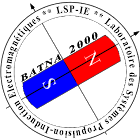, “Implementation of new adaptive power-split management strategy in a battery-super capacitor electric vehicle,” 2018 International Conference on Electrical Sciences and Technologies in Maghreb (CISTEM) IEEE. pp. 1-6, 2018.Abstract
Communication Internationale
, “Integral Backstepping Control of PMSM for Electrical Vehicle ApplicationOctober,” International Conference on Electrical Engineering -ICEE’2017. 2017.
, “Management, optimization and conversion of energy for self-governing house,” 2017 International Conference on Control, Automation and Diagnosis (ICCAD),Hammamet, Tunisia. pp. 429-433, 2017.Abstract
, “A real-time Backstepping control strategy for a doubly fed induction generator based wind energy conversion system,” 2017 6th International Conference on Systems and Control (ICSC), Batna, Algeria. pp. 549-554, 2017.
, “Optimal Energy Control of Induction Motor Standalone Photovoltaic-Battery Pumping System,” 6th International Conference on Systems and Control. 2017.
, “A comparative study of PI and Sliding mode controllers for autonomous wind energy conversion system based on DFIG,” 17th International conference on Sciences and Techniques of Automatic control & computer engineering , STA'2016. 2016.
, “Analysis and Design of rotor MRAS Speed Sensorless with a Novel Approach,” the 17th International conference on Sciences and Techniques of Automatic control & computer engineering, STA'2016. 2016.
, “Flux Observers Design for Induction Motor using Linear Parameter Varying Observer and Sliding Mode Observer,” the 17th International conference on Sciences and Techniques of Automatic control & computer engineering, STA'2016. 2016.
, “Nonlinear Control of the Doubly Fed Induction Generator used with Wind Turbine for an Isolated Grid,” 17th International conference on Sciences and Techniques of Automatic control & computer engineering , STA'2016. 2016.
, “Samir BOUSLIMANI, Said DRID and L. CHRIFI ALAOUI, Pascal Bussy and Mohamed “Inter-Turn Faults Detection using Park Vector Strategy,” the 17th International conference on Sciences and Techniques of Automatic control & computer engineering,STA'2016. 2016.
, “dSPACE Real-Time Implementation of Maximum Power Point Tracking Based on Ripple Correlation Control (RCC) Structure for Photovoltaic System,” 5th International Conference on Systems and Control, Cadi Ayyad University, 2016.
, “Impact of RDG Penetration on IDMT Overcurrent Relay Operation in Radial MV Distribution System,” International Conference on Recent Advances in Electrical Systems (ICRAES) 2016. 2016.
, “Electromagnetic, flow and thermal coupling in a MHD pump taking account the saturation of the ferromagnetic material,” Eleventh International Conference on Ecological Vehicles and Renewable Energies (EVER’16)EVER’2016. 2016.Abstract
, “A new flux rotor based MRAS for sensorless control of induction motor,” 5th International Conference on Systems and Control (ICSC), Marrakesh, Morocco. pp. 365-370, 2016.Abstract
, “Robust Backstepping MPPT for Photovoltaic System,” 3rd International conference on green energy & Environmental engineering GEEE’2016. 2016.
